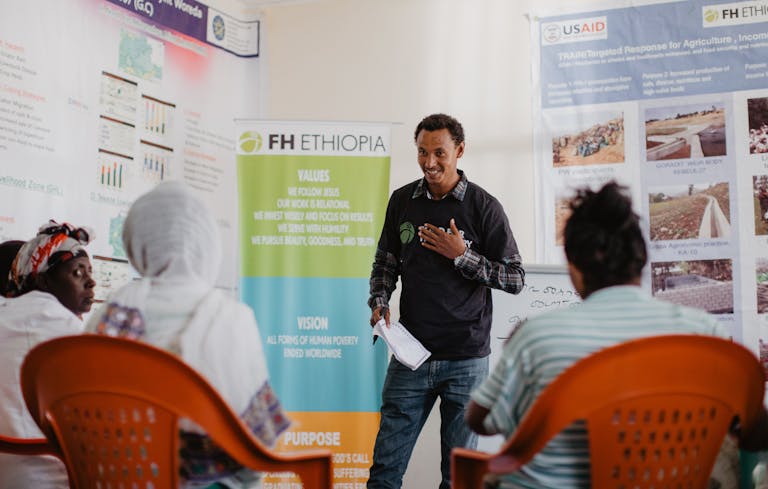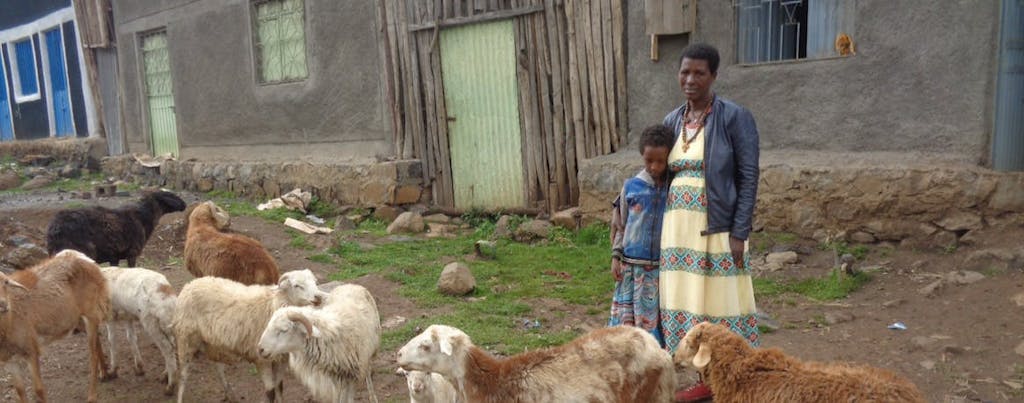Donation Multiplying Program Transforms Life for Ethiopian Mom
Habtam was a caring mother who was very concerned about finding help for her children.
Life was very challenging where the family lives in Lay Gayint, Ethiopia. She had no money to pay for the most basic necessities for her household.
Feeding the children was a struggle every day. The educational materials and other items required to allow them to attend school were completely out of reach for her.
Hope was Elusive
She struggled to find ways to make a living and saw no hope for change. “There were many days that my children, when they could go to school, arrived with empty stomachs,” Habtam explains.
But it hadn’t always been like this. Life was better when her husband was alive.
“When my husband passed away, I tried to find work as a day laborer,” Habtam says. “But because of my health conditions, I was not physically able to perform the tasks required. So employers didn’t want me for their jobs.” Habtam says she then became completely hopeless.
A Terrible Solution
“Finally, I decided I would leave my children to anyone who would take care of them so at least they could find new lives,” she says.
But then Habtam instead found hope – through the Food for the Hungry (FH) Orphans and Vulnerable Children (OVC) project. This vital project is one of many that is supported through matching grants from generous FH partners and individual supporters. Her two children joined in 2008.

Hope Arrives for Children and Mother
The children began receiving food and medical care, and also educational materials that enabled them to attend classes.
And there was hope for Habtam, as well. The project staff encouraged her to join a savings group and engage in income-generating activities.
She joined a saving and credit cooperative, which made her eligible to receive a 5,000-birr loan ($90 US dollars) to purchase five sheep. FH also provided training in how to care for the livestock.
Multiplying her Success
She qualified for a new loan to expand her business and bought a dairy cow with those funds. The cow’s milk provides nutrition for her household and surplus that she could sell at the local market in order to buy a variety of healthy foods for the family.
“Now I can feed my children three times a day,” she says proudly, “and sometimes they also have snacks after school.”
The children became eligible to receive health insurance. Habtam took part in discussion groups and qualified for counseling. Over time, her success and self-worth grew noticeable. She soon became a role model for other mothers who previously believed that they, too, were incapable of supporting themselves.
Gaining Self-Worth and Hope
“The counseling services I received from social workers changed how I thought about myself. Before, I believed I could do nothing of value. But now I am one of the voluntary caregiver mothers in the community dedicated to helping others,” Habtam says.
Her oldest son is now 17 years old and enrolled in college. Her young daughter, Kalkida, is 10 and attending the fourth grade.
“I feel I am in the right lane for change now, thanks to God and FH supporters who made this project possible,” she says.
FH’s highly successful Orphans and Vulnerable Children (OVC) project is an excellent example of how matching grants can make a huge difference for a whole community. The matching funds received provided nutrition, health, education, and livelihood assistance that transformed the lives of Habtam and her family, helping them build resilience so they will be able to flourish.
See Similar Posts:
Good Neighbors Solve Irrigation Conflicts


